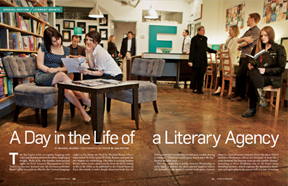Poets & Writers Magazine welcomes letters from its readers. Please post a comment on select articles at www.pw.org/magazine, e-mail editor@pw.org, or write to Editor, Poets & Writers Magazine, 90 Broad Street, Suite 2100, New York, NY 10004. Letters accepted for publication may be edited for clarity and length.
 THE BUSINESS OF AGENTS
THE BUSINESS OF AGENTS
“A Day in the Life of a Literary Agency” (July/August 2012) by Michael Bourne was a good reminder that we typically have less than a minute to capture an agent’s attention via a query letter. I had to laugh (so I wouldn’t cry!) when I read agent Scott Hoffman’s comment about only taking on projects that are deemed salable, because if he spends fifty to a hundred hours working on a book and it doesn’t sell, “that’s a hundred hours…spent without getting paid.” Multiply those hundred hours by ten, and we still aren’t close to the number of unpaid hours most writers put in. I’ve written three books—one published, one circulating, one in revision—and I can no longer count that high. I completely understand it’s simply business, but I want to note that writers’ workdays do not usually include the salve of lunch meetings in cozy French restaurants. Rather, they are more like solitary confinement. Which, of course, is just how it all works.
Kathy Briccetti
Berkeley, California
CULTURAL COMPROMISE
Belinda Acosta’s “Librotraficante Takes Back the Book” (July/August 2012) was a fascinating article. What seems to me to be the spirit of Arizona House Bill 2281—to increase students’ self-awareness as individuals—could be acceptable. After all, the law would also ban white-supremacy literature from being taught. I hope this great article inspires further discussion about what public schools should endorse and teach. Is it in students’ best interest to offer programs focused on pride in one culture? It’s not an easy question to answer. I hope a compromise is reached, one in which books from many cultures are read and students are taught reverence for life of all kinds.
Patrick Moore
Tucson, Arizona
FULLY DEVELOPED
What is it like to develop characters so true that readers feel exposed by their shame and celebrated in their small, hidden victories? J. T. Bushnell’s “The Jerks: Creating Sympathetic Characters” (May/June 2012) is a call to duty. He challenges writers to revise and refocus and resolve to continue doing so until it hurts—until the first-draft jerks mature into flawed, curious creatures who open new veins of pleasure for every valued reader.
Elaine Joy Lambert
Montoursville, Pennsylvania
I WILL GO ON
I just turned sixty-two and received another rejection for a piece of flash fiction that didn’t even make the long list. As we begin to do on birthdays at my age, I think about the things I might never get done—like the novel I’ve been working on for nine years or the collection of short stories I’ve been working on for fifteen. I’m too busy writing reports instead of novels and paying for my only child to go to college. I almost didn’t buy the May/June 2012 issue. Contests? Please. And Chris Huntington, of course—some cute young contest winner? But I read “Why We Write: You’re Not Alone” anyway, and promptly broke into tears. How can I not finish my work? I thought of my published writing—stuff about my family, about my daughter in particular, who in thirty years will read it and laugh and feel connected. Samuel Beckett, my dark companion these days, whispers, “I will go on.” Thanks for reminding me why.
Nina Gaby
Brookfield, Vermont






